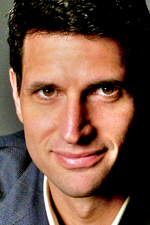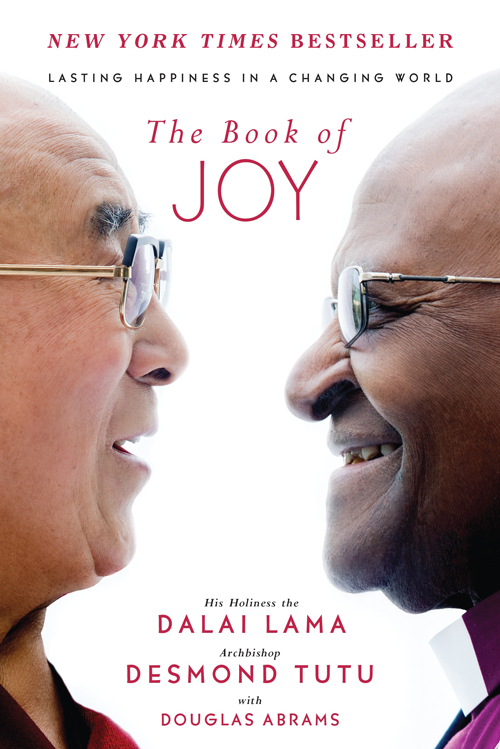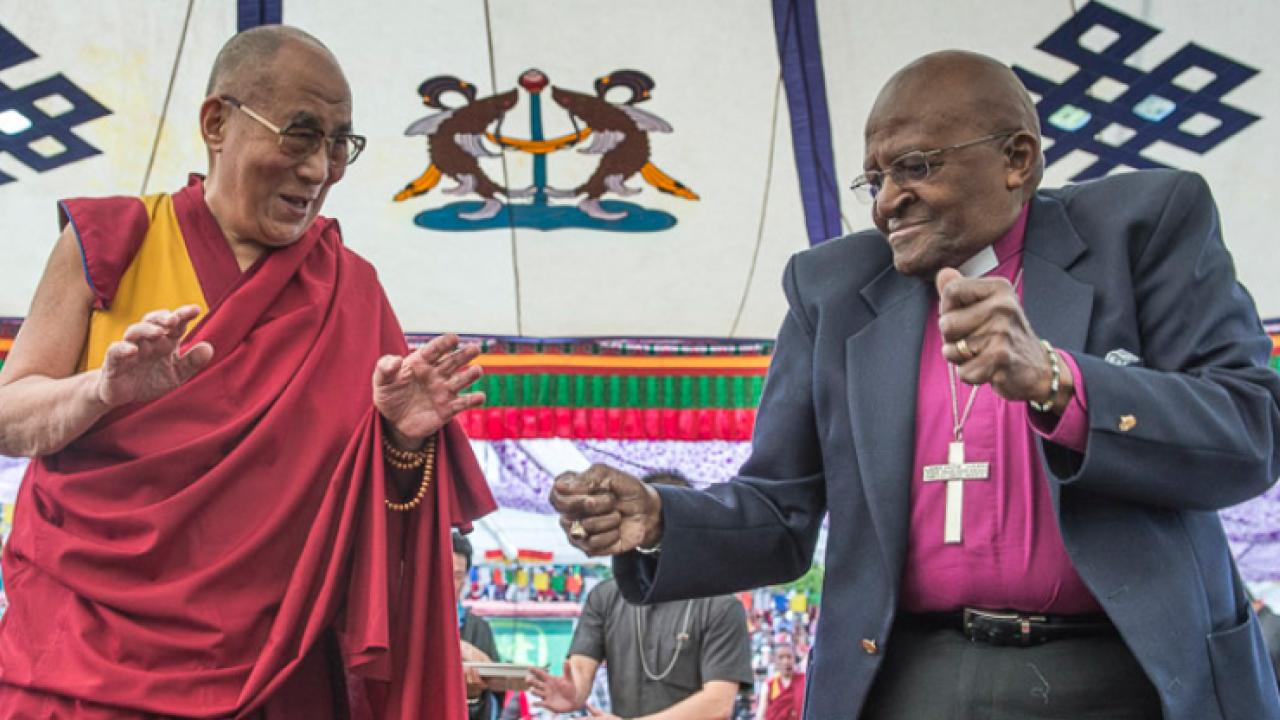Quick Summary
- 2018-19 Campus Community Book Project: The Dalai Lama and Archbishop Desmond Tutu discuss joy and its importance to a life well-lived, even in the face of adversity
- Selection committee says the book‘s lessons bode well for a more connected campus community
- Lectures, panel discussions and more will be scheduled from fall into winter, culminating in co-author Douglas Abrams‘ campus visit
A book that started with a conversation will now be a conversation starter at UC Davis — as the 2018-19 Campus Community Book Project.
It is The Book of Joy: Lasting Happiness in a Changing World by the Dalai Lama and Archbishop Desmond Tutu, two of the world’s best-known faith leaders, both of them Nobel Peace Prize recipients, who in this volume are discussing something else that distinguishes them: their overwhelming joyfulness, even in the face of fear and suffering and sorrow and other of life’s challenges, a joy that the authors strive to impart to others.
The selection committee, charged with choosing a book on the theme of “Community Building,” says The Book of Joy bodes well for a more connected campus where people are generous of spirit, gratitude, compassion and acceptance.
THE BOOK PROJECT
Sponsored by the Office of Campus Community Relations, the book project began in the aftermath of 9/11 as a means of sparking dialogue among faculty, staff, students and the wider community — respectful dialogue among people who may have diverse viewpoints on the topic at hand. Each book fits into a theme that changes from year to year.

Lectures, panel discussions and the like to accompany The Book of Joy will start in the fall and extend into winter quarter, culminating with co-author Douglas Abrams’ visit to campus in February. He will participate in a forum in the afternoon and give a lecture in the evening, sharing insights on the Eight Pillars of Joy and making suggestions for what you can do to lead a more joy-filled life.
The Book of Joy stems from a week of dialogue between Tutu and his beloved friend the Dalai Lama in April 2015 on the occasion of the latter’s 80th birthday. Douglas Abrams, who has been writing with Tutu for more than a decade, sat in on the conversation and relates it in the book, while also including the latest findings from the science of joy and sharing stories of his subjects’ time together that week at the Dalai Lama’s home in Dharamsala, India.
‘Perfect moment’
“This book arrives at the perfect moment,” said Cheryl Bach, a member of the book selection committee. “It reminds us that we can live with peace and joy in our hearts — amid the madness. It reminds us about compassion and gratitude and attending to them consciously.
“Given the Principles of Community at UC Davis and all the efforts for inclusiveness and respect for all communities, the book speaks to our shared values and fits in with the culture we are trying to achieve here,” said Bach, an institutional analyst in Budget and Institutional Analysis, part of Finance, Operations and Administration.
Tutu and the Dalai Lama come from very different faith practices — the former is an Anglican minister, the latter a Buddhist monk — and yet they “demonstrate in their loving and caring relationship that differences need not mean confrontation and bickering,” said Laurie Warren, another member of the selection committee.
“Neither man is advocating or teaching his faith in this book,” said Warren, IT manager in the Department of Agricultural and Resource Economics. “It is about sharing their wisdom with all of us, and we can all become richer for the reading of it.”
Positive results
Professor Bob Emmons, a member of the book selection committee, has assigned The Book of Joy twice in his “Psychology of Emotion” course and seen positive results, including the time a student wished everyone success as they were about to take their final. “I believe that was an outcome of the book’s emphasis on connection, compassion, generosity, acceptance and other-mindedness,” Emmons said.
THE BOOK

- By the Dalai Lama and Archbishop Desmond Tutu, with Douglas Abrams
- Avery Books/Penguin Random House
- Published Sept. 20, 2016
- The book, in hardcover, is available at UC Davis Stores at a discount price of $17.99, and will be available for loan from the Office of Campus Community Relations, 412 Mrak Hall.
“The authors teach that creating happiness for others is the best way to raise one’s own level of happiness,” Emmons said. “Joy not only helps to make life worth living for people, it can motivate people to give of themselves for the good of others. Joy provides an uplifting sense of goodness that can sustain other virtues, contributing to a truly flourishing life. I think we began to see this kind of growth in the students.”
Committee member Bach said The Book of Joy has the potential to inspire the many students who want to understand how they can change the world and “be the change” they want to see. “The ability to be other-directed, see new perspectives and cultivate compassion is key to developing that energy,” she said of the book’s lessons. “When we are thinking only of ourselves, we cannot see others and certainly cannot solve community problems.”
Design professor Glenda Drew, another member of the selection committee, said she sees the book as a prescription for improved mental health. “The Book of Joy offers strategies and insights to self-realization, joy and community that can support readers to build tools that can last a lifetime,” she said.
She said she will use the book in “Studio Practice in Design,” a graduate course for first-year Master of Fine Arts students. “We will read and discuss The Book of Joy, and it will become the conceptual springboard for a visual exhibition that will be showcased in Davis at the end of fall quarter.”
“I have taught this course twice before and both times aligned the course with the Campus Community Book Project, which proved to be a fantastic way to connect first-year graduate students with the campus and greater community along timely topics.”
